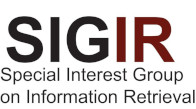Elaine Toms

Monday the 11th of March at 9:30AM
Title: Interacting with Information is about much more than Experience!
Abstract: For nearly half a century, information retrieval and human computer interaction have operated in parallel to make finding and retrieving information and information objects more efficient and effective in a process that is at least pleasing to the user. This research has given us pinpoint precision in retrieval that is also a mostly satisfying experience. One would think the job was done!
Today just about every human endeavour is driven by the consumption of data and information, and yet our understanding of what humans do with all that data and information is limited. We are more likely to describe and evaluate that consumption in behavioural terms (e.g., keystrokes, mouseclicks, use) or perhaps outcomes (e.g., the information was found, the report was completed), while paying only ‘lip service’ to the workhorse – the cognitive processes (e.g., analyse, evaluation, retrieve) that are engaged and challenged in every instance of interactivity. Data/information have analogically been described as the oil and gas of the post-industrial age; in parallel, human cognitive processes can be construed as the industrial machinery. Surprisingly we do very little to support them.
There are two key threads in this talk. The first focuses on those human processes that we effectively ignore in our discussion of information/data use. We will start with the original task (i.e., what do people do?) and drill down. The second considers those tools that could facilitate cognitive processes and enable efficiencies. While typical office software provides a thousand (or more) tools that manipulate, for example, something as mundane as the colour of a pixel, we do little to support the intense work that humans do in interacting with information except for a few ‘low hanging fruit’ such as a word finder or grammar checker. Finally, this talk will also address the ‘elephant in the room’ -- AI, and whether this is the ultimate tool.
Bio: Elaine Toms is Professor of Information Innovation & Management, Management School, University of Sheffield, UK. Her research has examined multiple facets of the information interaction problem from from interruptions to serendipity, with a particular focus on evaluation, and now on the task.
After completing her PhD at Western University (Canada), she went on to several posts: iSchool, University of Sheffield; the Faculty of Management, and School of Information Studies, Dalhousie University, Halifax, Canada; and the Faculty of Information, University of Toronto, also in Canada. She was the first information scientist to be appointed to a prestigious Canada Research Chair. Her work has been funded by multiple groups on both sides of the pond (e.g., both the science and social science research councils in Canada, OCLC, Heritage Canada, Canada Foundation for Innovation, EU Horizon programmes). She has been an investigator with multiple research networks (e.g., NECTAR, Network for Effective Collaboration Through Advanced Research; PROMISE (Participative Research labOratory for Multimedia and Multilingual Information Systems Evaluation); DoSSIER (Domain Specific Systems for Information Extraction and Retrieval). Her research appears in over 100 scholarly publications in refereed journals and conference proceedings.
Max Wilson

Tuesday the 12th of March at 9AM
Title: The HCI Perspective on IR
Abstract: The setup of the ACM CHIIR conference was an exciting culmination of a community push towards studying people and how they engage in information retrieval. I was excited to be part of these initial developments during my PhD, lucky to be able to collaborate with amazing people, and supported to volunteer as part of the community. In practice, the history between IR and HCI began decades earlier, and in many respects, CHIIR remains primarily part of the IR community. As someone firmly rooted in the HCI community, my plan for this talk is to reflect on the history of research around both IR and HCI, including my own experience of it, and to discuss future research challenges and opportunities we may face together.
Bio: Max is an Associate Professor of Human-Computer Interaction in the Mixed Reality Lab at the University of Nottingham, UK. Max leads the Brain Data Group, which focuses on the role that mental workload plays in our every day lives as we interact with technologies. This involves a) scientifically measuring levels of mental workload in lab studies, b) evaluating how we experience mental workload in every day life, and c) unpacking the neuroethics of neurotechnology as it becomes part of our lives. His focus on this research agenda emerged from his doctoral research evaluating complex forms of search, which often leads to us building more complex search user interfaces. Max won the 2009 Best JASIST article award for his research evaluating search user interfaces with information seeking theory. In the information retrieval community, he co-led the EuroHCIR workshops, served on organising committees for the IIiX and CHIIR conferences, and sat on the CHIIR steering committee. Max is a deputy editor at the IJHCS journal, and sits of the CHI steering committee, having served on 10 years of organising committees for the CHI conference.



